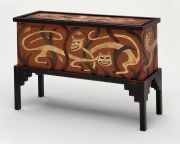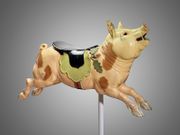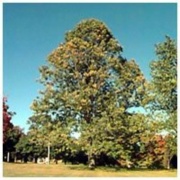Basswood
Description
Several species of large deciduous trees of the genus Tilia, such as T. americana (linden). The light-brown wood from these trees has a straight grain, fine texture and is easily worked. Because pale brown linden wood is soft and workable, it has been used since at least the 1600s for decorative items with intricate carvings, such as picture frames and sculptures. The wood has been commonly used for electric guitars becsuse it is lightweight and resonant; it is also used for inexpensive millwork, furniture, plywood, novelties, excelsior, boxes, and crates. Additionally, the tough, fibrous inner bark has been used to make ropes.
- For basswood fiber identification, see http://cameo.mfa.org/wiki/Category:FRIL:_American_Basswood
Synonyms and Related Terms
Tilia americana; Tilia glabra; Linden (Deut.); lime tree (Br.); limewood; basswood (N. America); tilleul (Fr.) ; tiglio (It.); tilia (Port.); tilo (Esp.)
Physical and Chemical Properties
- Height = medium sized tree (18-37 m) with trucnks of 1-1.5 m
- Bark = light brown to gray with narrow fissures
- Leaves = long and broad (10-15 mc long) with serrated margins; occur singularly and alternately on branches
- Fruit = small, hard, cream-colored nutlet (8-10mm)
- Specific gravity = 0.40-0.45 (air dry)
- Density = 20-40 ppcf
Working Properties
The close-grain wood does not split easily. It has low strength and poor bending ability but stains, polishes and holds screws and nails well.
Additional Images
Resources and Citations
- Alden Identification Services, Microscopic Wood Identification: Link
- Wikipedia: https://en.wikipedia.org/wiki/Tilia_americana (Accessed October 13, 2020)
- Ralph Mayer, A Dictionary of Art Terms and Techniques, Harper and Row Publishers, New York, 1969 (also 1945 printing)
- Hermann Kuhn, Conservation and Restoration of Works of Art and Antiquities, Butterworths, London, 1986
- F. H. Titmuss, Commercial Timbers of the World, The Technical Press Ltd., London, 1965 Comment: 23-40 ppcf
- Van Nostrand's Scientific Encyclopedia, Douglas M. Considine (ed.), Van Nostrand Reinhold, New York, 1976
- Random House, Webster's Encyclopedic Unabridged Dictionary of the English Language, Grammercy Book, New York, 1997
- Hardwood Manufacturers Institute, Memphis Tenn.: air-dry weight = 26 ppcf
- The American Heritage Dictionary or Encarta, via Microsoft Bookshelf 98, Microsoft Corp., 1998
- Edward Reich, Carlton J. Siegler, Consumer Goods: How to Know and Use Them, American Book Company, New York City, 1937
- CRC Handbook of Chemistry and Physics, Robert Weast (ed.), CRC Press, Boca Raton, Florida, v. 61, 1980 Comment: density=20-37ppcf (0.32-0.39g/cm3)
- Gordon Hanlon, contributed information, 1998 Comment: density=25-35 ppcf (0.40-0.45g/cm3)





